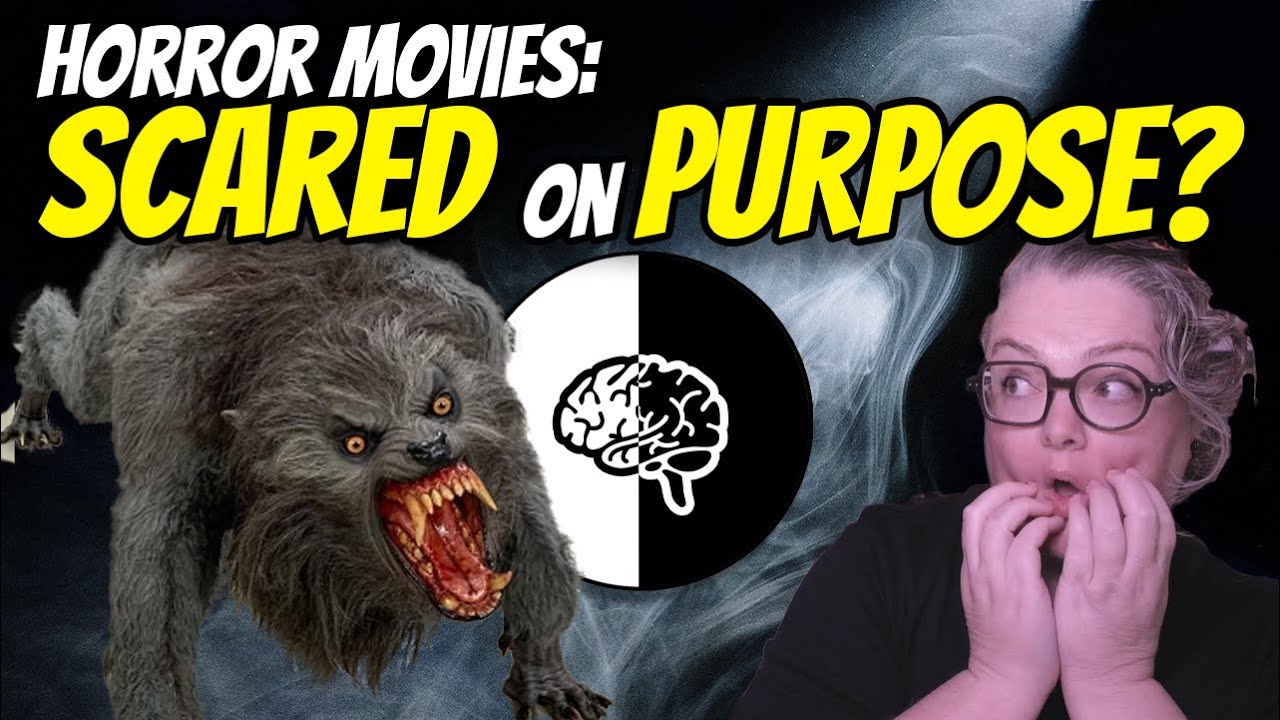Why People Love Scary Movies And What It Means For Society
Why people love scary movies and what it means for society. As you turn around, you hear the sound of a chainsaw. You spin around to face it and see that it is massive, not quite a man, or maybe it is, and that gory pig's head is merely a mask. Holy crap, that's a pig's head covering his face.
Author:Suleman ShahReviewer:Han JuNov 01, 2022160 Shares159.8K Views

Why people love scary movies and what it means for society.As you turn around, you hear the sound of a chainsaw. You spin around to face it and see that it is massive, not quite a man, or maybe it is, and that gory pig's head is merely a mask. Holy crap, that's a pig's head covering his face.
Your body doesn't care that you're there freely, that you purchased a ticket and laughed about how much fun this would be with your pals. Anxietycauses your heart rate to quicken, your hands to get cold, and your eyes to widen. The root of the problem is terror. Even though you are meant to enjoy yourself, it makes no difference.
A woman puts a VHS tape into the player, and the TV screen goes to a black and white flickering. A ring of light glows on the screen as a strange hum fills the room. There's a brief period of static on the screen before the ring is replaced by a whirlwind of other images. One tree that has caught fire. Maggots in a writhing mass. A jar stuffed with writhing severed digits.
Once more, the TV goes black and there is only static. The phone rings in the other room. The young woman, shaking and panting, reluctantly takes it. Over the phone, a voice says, "Seven days," confirming the tape's rumored authenticity. If you watch it, you'll die a horrible, horrible death exactly one week from now.
The Ring opens with this. Movies like these scare some people. Some like a good scare. They'll like haunted homes and frightening movies.
“„Even though I knew that there was a price, that price might be checking for monsters under the bed. Or sleeping with the lights on. But, like for many other people, it’s a price I’m willing to pay. I was always curious about that weird fascination — what’s often called the paradox of horror.- Mathias Clasen
Horror films aim to evoke negative feelings. Shock, horror, disgust. Yet many prefer to see movies with terrifying clowns, bloodthirsty creatures, and crazed killers.
Clasen runs Aarhus University's Recreational Fear Lab. He and othersare illuminating the dark media's attraction. New studies are revealing who enjoys horror and why. The discoveries may also explain a strange human tendency. They may show how the media helps individuals overcome real-lifeanxieties.
Fear Was A Tool For Survival
Fear has been a primary motivator for the vast majority of human history. However, it has been put to other uses as well. Fear may be a rite of passage, such as when a person must face a difficult test as a precursor to maturity. The use of terror as a tool of social control may be traced back to Jonathan Edwards' sermon "Sinners in the Hands of an Angry God," delivered in 1741.
Animals rely on the physiological reaction of fear to help them survive, but fear is also a human emotional state, and it's not a pleasant one. All of these forms of entertainment are aimed squarely at making viewers feel bad about themselves, emotionally and physically. For quite some time, similar considerations have been given to the appeal of tragedies.
In his Poetics, Aristotle examined the phenomenon of humans finding pleasure in tragic tragedies. David Hume, a Scottish philosopher of the 18th century, referred to this as a "paradox of tragedy." Noel Carroll, who used to teach philosophy at New York's CUNY Graduate Center, took the same point of view in his 1982 book, The Philosophy of Horror, or Paradoxes of the Heart.
However, the transition between the late 18th and early 19th centuries marked a significant shift. Uncanny elements are common in Gothic literature, which authors like Mary Shelley, Charles Robert Maturin, and Matthew Lewis helped popularize. The likes of Bram Stoker, Edgar Allan Poe, and Stephen King owe much to their efforts. Now that there are haunted houses and games like Resident Evil, the horror genre is more than just about surviving.
Recent Interest In Scary Movies
During the night, a young person walks across a cornfield. He walks by a scarecrow that has been hanged on its post at an angle and gives it a friendly shoulder check. After what appears to be just a few minutes, he walks right by the scarecrow again.
The young man walks away bewildered. But he eventually comes to a halt again. The scarecrow's post is positioned just here along the walkway. Who's the scarecrow? We can no longer access it.
There is no easy solution to the issue of why people appreciate such sequences as these from Scary Stories to Tell in the Dark (2019). "Adrenaline addicts," "white knucklers," and "dark copers" are the three categories of horror lovers. Some individuals relieve their negative emotions and life experiences by immersing themselves in frightening fiction.
Sociologist Margee Kerr claims that completing a tense film gives the viewer a feeling of satisfaction. Expert psychologists from Pennsylvania's Clasen University assessed 260 people who had experienced a haunted attraction. People spoke about their experiences and what they took away from the haunt afterward.
Surprisingly, those who faced their anxieties in the haunted house reported feeling the most positive emotions. It seems that individuals like the excitement and difficulty of scary stories.

Horror Movies: Why do people like to be scared? (According to science)
Horror In Fictional Movies
A survey of over a thousand individuals in the United States uncovered distinct subsets of horror lovers and those who had no interest in the genre at all. Those who scored higher on the thrill-seeking personality characteristic were the ones who liked scary movies the most. Generally speaking, males were found to be more enthusiastic about horror films than women.
Women may be socially pressured to seem strong, which reduces their tolerance for scary movies. Those with a greater need for effect seek situations that will make them feel something, positive or negative. Research conducted in Germany examined the impact of films on moviegoers' ability to deal with bad feelings. One such misconception that must be addressed is the assumption that horror movie fans have a lower capacity for empathy.
Empathy has been shown to have no impact on whether or not one enjoys frightening movies. However, depending on the film, empathy may either heighten or dampen a viewer's fear response. Watching a horror film probably won't have too much of an effect on your psyche.
According to researcher David Scrivner, watching horror films is a great way to experience unpleasant feelings in a controlled environment. Horror enthusiasts claim to feel less fear when a pandemic or zombie apocalypse occurs. A recent study found that those who regularly engage in the practice of seeing horror films have more resistance to the psychological effects of the stress of a pandemic.
Fight Or Flight Mode
Over $13 billion was made by horror films between 1995 and 2022 in the United States and Canada, making it the sixth most profitable film genre. Physiology plays a role, but there are other elements at play as well. Although the concept of facing one's fears via voluntary participation is not new, the chosen medium has evolved.
When the sympathetic nervous system reacts to a perceived danger before the individual can determine whether or not the threat is genuine, this is known as the "fight-or-flight" response. Because of this automatic response, the body makes adrenaline, which can have powerful effects.
It may also trigger the secretion of hormones and neurotransmitters that speed up the body's metabolic rate. Dr. Steven Schlozman has shown that seeing a really disturbing film may have the same effect.
Final Words
A person's ability to deal with adversity in real life may be boosted by watching scary movies. If horror movies aren't your thing, you may always try your hand at writing your own. She gushes that Monster flicks are great. Writing your own horror movie screenplay or seeing a movie with your fingers are two more methods to put yourself through a mental pacesetter.

Suleman Shah
Author
Suleman Shah is a researcher and freelance writer. As a researcher, he has worked with MNS University of Agriculture, Multan (Pakistan) and Texas A & M University (USA). He regularly writes science articles and blogs for science news website immersse.com and open access publishers OA Publishing London and Scientific Times. He loves to keep himself updated on scientific developments and convert these developments into everyday language to update the readers about the developments in the scientific era. His primary research focus is Plant sciences, and he contributed to this field by publishing his research in scientific journals and presenting his work at many Conferences.
Shah graduated from the University of Agriculture Faisalabad (Pakistan) and started his professional carrier with Jaffer Agro Services and later with the Agriculture Department of the Government of Pakistan. His research interest compelled and attracted him to proceed with his carrier in Plant sciences research. So, he started his Ph.D. in Soil Science at MNS University of Agriculture Multan (Pakistan). Later, he started working as a visiting scholar with Texas A&M University (USA).
Shah’s experience with big Open Excess publishers like Springers, Frontiers, MDPI, etc., testified to his belief in Open Access as a barrier-removing mechanism between researchers and the readers of their research. Shah believes that Open Access is revolutionizing the publication process and benefitting research in all fields.

Han Ju
Reviewer
Hello! I'm Han Ju, the heart behind World Wide Journals. My life is a unique tapestry woven from the threads of news, spirituality, and science, enriched by melodies from my guitar. Raised amidst tales of the ancient and the arcane, I developed a keen eye for the stories that truly matter. Through my work, I seek to bridge the seen with the unseen, marrying the rigor of science with the depth of spirituality.
Each article at World Wide Journals is a piece of this ongoing quest, blending analysis with personal reflection. Whether exploring quantum frontiers or strumming chords under the stars, my aim is to inspire and provoke thought, inviting you into a world where every discovery is a note in the grand symphony of existence.
Welcome aboard this journey of insight and exploration, where curiosity leads and music guides.
Latest Articles
Popular Articles